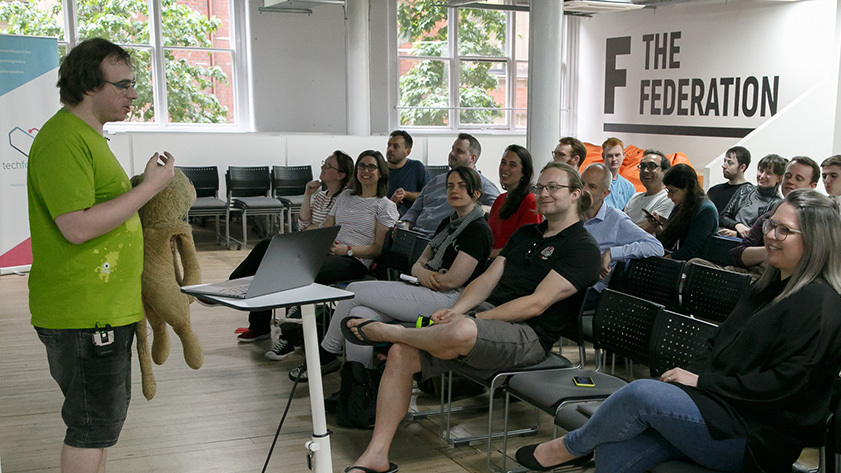Tech for accessibility
Written by Alina Kadyrova
On a hot day at the end of June, a room full of people - with an interest in how tech can be used for good, descended upon the Federation to learn about the intersection between technology and accessibility.
We heard from three exceptional speakers; each talking to us about their personal and professional experience of using and developing technology to facilitate the life and careers of disabled people.
First up were Jamie and Lion. Jamie asked, have you ever thought about how a smartphone changed your life?
Or, how about that brightly coloured wallpaper? Oh - and those extraordinarily loud hand dryer noises? Have we considered how they can stop some people from communicating.
Jamie and Lion are an autistic duo who both work at the BBC. Jamie is as a senior research engineer; he makes sure people with different needs can easily access things like iPlayer, digital radio or gaming. Lion’s main tasks include antelope management.
Check the news - everyone has an opinion on whether smartphones make us smarter or dumber. That’s a place for a whole other block. But for Jamie, the introduction of the smartphone into his life was significant. The iPhone and the advancements in voice tech freed him from the presumption that he has got nothing to say and it changed people’s attitudes towards him as soon as they realised that he could communicate.
For those of us in the room, it came as a surprise that for Jamie, the process of communicating everyday is like climbing a mountain. Within minutes of Jamie beginning his talk, he had captivated the entire room.
But, climbing this mountain is, in reality, overcoming the barriers that disabled people like Jamie face. These barriers include distractions such as noise, bright light, bright wallpapers, presence of many unknown people, a need for immediate answers, and the chaotic flow of conversations. Removing these barriers allowed the flow of speech and ensured effective communication.
The second speaker was Stuart Hill from Access Hospitality, a company that develops software to facilitate the employment of disabled people in the hospitality industry. Just imagine — only approximately 6% of people with a learning disability are known to the local authorities and are in paid employment. Stuart explained that the primary barrier that these people face is their short-term memory when they have difficulty in remembering orders or where to get things in a complex bar environment.
Stuart started with a desire to help a young man with learning difficulties working behind the club bar where they both play rugby; this led to the creation of a system that helps to navigate the bar using on-screen prompts. These prompts would show, for instance, what glass size is needed or what tap to choose.
So far, the software has made a remarkable impact on people with learning difficulties. Clear step-by-step instructions allow people with learning difficulties to build confidence when they feel very involved and how they can contribute to the bar work in a very rewarding way.
The software brings numerous benefits to an employer as well, such as the added level of customer experience along with loyal and reliable staff. In September, Stuart is planning to extend the functionality of the software and add photos, short videos and voice recordings to regularly remind a person of their tasks. I’m excited to hear about how this progresses!
Our third speaker was Abigail Ward from Drake Music. Abigail reminded us that while music can transform the lives of people with disabilities, many musical instruments are not designed with accessibility in mind. Drake Music is a charity that aims at resolving this problem by uniting music, technology and disabilities.
Drake Music DM Lab North West started as an idea to get a few hackers together to experiment. It gradually grew into hackathons and then into a network of disabled musicians.
The Lab hosts regular “challenges” aimed at supporting the development of brand new accessible instruments. Each team taking part in the challenge has to come forward with a new accessible instrument and must contain at least one disabled musician.
The teams came up with brilliant ideas - for example, Billy’s violin – a tool looking like a small handle, which makes different sounds depending on the direction and speeds at which you move it. Another example is Hannah’s Harp developed for and by Hannah, who thought she would never be able to make music – and she recently performed at Manchester HOME using it.
Drake Music needs funding, more group members, accessible hackspaces and more performance opportunities – if you can help, do reach out to them.
For me personally, this was eye-opening. As I travelled home, I could not get it out of my mind - how simple things such as reducing the brightness of the light can make a big difference for someone else, and to make them feel included. It is the places, and the things that we build, that disable people.
Looking around the room, it was clear that the audience was encouraged and inspired by the talks. As we all chatted afterwards, there was obvious excitement. Also hunger, it seems, because the pizzas disappeared in record time!
Join us at the next Tech for Good Live event to learn about platform cooperatives.
Written by Alina Kadyrova



